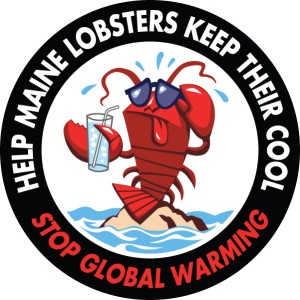We have much more to do and your continued support is needed now more than ever.
Media Ignores Climate as Lobsters Feel the Heat
As threats to lobsters associated with warming ocean temperatures creep northward into Maine, the Associated Press has crept away from reporting on the climate change, despite evidence that rising seawater temperatures threaten lobsters.
The impact of climate change to lobster and cod off the coast of Maine is no secret. Just last month the National Wildlife Federation’s state affiliate, the Natural Resources Council of Maine, launched a campaign to raise public awareness on how climate change is threatening Maine lobsters.
According to the New England Aquarium:
Lobsters are cold-blooded, their body temperatures determined by the water in which they live. Higher temperatures cause cold-blooded animals to use more energy for respiration, leaving less energy for feeding, growth, energy storage, immune response and reproduction. Much of a lobster’s life is related to the temperature on the ocean floor — what it eats, how successfully it breeds, where it migrates.
However, in last week’s article, the Associated Press referenced the high ocean temperatures in 2012 while staying silent on the link to climate change, despite climate change having driven the record-high temperatures in 2012. As the National Oceanic and Atmospheric Administration stated for their State of the Climate in 2012 report:
“Many of the events that made 2012 such an interesting year are part of the long-term trends we see in a changing and varying climate — carbon levels are climbing, sea levels are rising, Arctic sea ice is melting, and our planet as a whole is becoming a warmer place,” said Acting NOAA Administrator Kathryn D. Sullivan, Ph.D.
And the Associated Press is not alone in this forgetfulness when it comes to the cause of record high temperatures.
As we just reported last week when Reuters reported on a massive fish die-off in Alaska due to high temperatures, news outlets are continually ignoring evidence of climate change. The pattern of omitting climate science from their stories includes failing to report on the climate context of wildfires in the West, ignoring that climate change is increasing the frequency of large rain storms and worsening flood risks in the Midwest, and flat-out ignoring the 2012 State of the Climate Report released this month by the National Oceanic and Atmospheric Administration (NOAA).

“We’re dealing with a fragile environment,” Merryman said, noting that climate change is also a threat to lobster fishing, the “heartbeat of so many coastal communities.”
![]() Speak up in support of action on climate to protect wildlife from Maine’s lobsters to Alaska’s polar bears.
Speak up in support of action on climate to protect wildlife from Maine’s lobsters to Alaska’s polar bears.






















